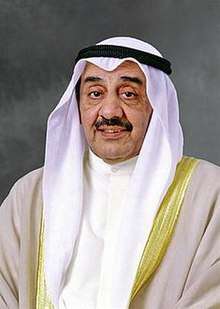Jassem Al-Kharafi
Jassem Al-Kharafi, (Arabic: جاسم محمد عبدالمحسن الخرافي), (1940 – May 21, 2015) was a Kuwaiti billionaire businessman who was the speaker of the Kuwaiti National Assembly from 1999 to 2011.[1] Al-Kharafi studied Business Administration at the Manchester Trade Faculty in Kuwait and was director of M. A. Kharafi & Sons before being elected to the National Assembly in 1975. He affiliated with the liberal deputies and was regarded as a pro-government liberal.[2] However, Al-Kharafi has broken with the royal family on occasion. He criticized the ruling Al-Sabah family, and in July 2006 vigorously denounced the Israeli attacks on Lebanon saying that the war would "turn us all into terrorists".[3][4]
Jassem Al-Kharafi | |
|---|---|
 Jassem Al-Kharafi | |
| Born | 1940 Kuwait City, Kuwait |
| Died | 21 May 2015 (age 75) |
| Nationality | Kuwaiti |
| Known for | Speaker of the Kuwaiti National Assembly from 1999 to 2011 |
| Net worth | US$1.25 billion |
| Spouse(s) | married |
| Children | 6 |
| Parent(s) | Mohammed Al-Kharafi |
| Relatives | Nasser Al-Kharafi (brother) Faiza Al-Kharafi (sister) Fawzi Al-Kharafi (brother) Marzouq Al-Ghanim (nephew) |
Al-Kharafi's family is wealthy. His brother Nasser was listed by Forbes as one of the richest people in the world. His sister, Faiza, was rector of Kuwait University. The University of Tirana on 7 October 2011 gave him an Honoris Causa title.[5]
Early life
Jassem Al-Kharafi was born in Kuwait City in 1940, the son of Mohammed Abdul Mohsen Al-Kharafi, the founder of M. A. Kharafi & Sons.[6]
Minister of finance
He was the Minister of Finance from 1985 to 1990.[7]
Public dispute with Prime Minister Nasser
On November 3, 2007, Al-Kharafi told the pan-Arab Arabiya television in an interview that he had "question marks" about Prime Minister Nasser Mohammed Al-Ahmed Al-Sabah's decisions. A transcript of the interview was published in Alrai daily, which included Al-Kharafi's comment that too many reshuffles necessitate "a review and an evaluation of what measures should be taken." Al-Kharafi said the reshuffle should not have been put off for the whole summer and that it indicated a "policy of patching" up problems, rather than solving them.
In response, Prime Minister Nasser issued a statement about Al-Kharafi to the state-owned Kuwait News Agency, which was splashed on the front pages of daily newspapers. In the statement, PM Nasser said that Al-Kharafi was overstepping in bounds in trying to influence cabinet selections: "I have no doubt that .... the speaker realizes that his attempts to interfere in forming the Cabinet and affecting its decisions is overstretching his constitutional mandate."
The back-and-forth marked the first such public tensions between a speaker and a prime minister.[8]
Views on Iran
On July 13, 2008, Al-Kharafi publicly accused the West of provoking Iran on the nuclear issue. In his interview with state-owned Kuwait TV, Al-Kharafi said, "What is happening is that there are provocative Western statements, and Iran responds in the same way... I believe that a matter this sensitive needs dialogue not escalation, and it shouldn't be dealt with as if Iran were one of America's states." [9]
Criticism of Human Right Committee's neglect of protocol
On July 1, 2008, Al-Kharafi criticized the assembly's human rights committee for holding a meeting with US embassy officials without asking permission from the speaker in accordance with protocol rules. Khorafi blamed the US embassy for committing a "procedural mistake" by accepting an invitation by phone, insisting that "the embassy should have told the committee that such meetings could not be arranged through this way and should have followed the right diplomatic procedures."
The meeting occurred on June 30, 2008, to discuss the latest US State Department report that accorded Kuwait a tier three status on trafficking in people for its treatment of domestic helpers and foreign workers. Later, the head of the committee, Waleed Al-Tabtabai, said the meeting was held on the basis of a request by the embassy and that the committee has not "overstepped the authorities of the speaker or the foreign ministry," adding that the committee had received similar requests in the past.
The US embassy officials were reported to have refused to discuss the US decision to freeze the assets of the Revival of Islamic Heritage Society.[10]
Speaker of Kuwaiti National Assembly
Al-Kharafi was elected Speaker of the National Assembly in 1999. He was reelected as Speaker in all elections after until deciding that he would not stand for reelection in the 2012 National Assembly elections. This was due to Al-Kharafi wanting to focus on the family business after the death of his brother Nasser Al-Kharafi. Ahmed Al-Sadoun succeeded him as Speaker of the National Assembly.
References
- (in Arabic)Former Presidents of the National Assembly
- "العائلات". Gsu.edu. Retrieved 2015-11-19.
- ISN Editors. "Articles / Security Watch / ISN". Ethz.ch. Retrieved 2015-11-19.
- "Kuwait magnate Jassem Al Kharafi dies at 75". Khaleej Times. Retrieved 2015-11-19.
- "UT i jep "Honoris Causa" Mohammad Al-Kharaf". Gazeta Panorama Online. Retrieved 2015-11-19.
- "Kuwaiti billioanire Jassim Al-Kharafi dies at 75". Dhow News. 22 May 2015. Retrieved 19 November 2015.
- "وزارة المالية - دولة الكويت". www.mof.gov.kw.
- "Kuwait: US embassy meeting with right panel angers Khorafi - Google Search". Google.com. Retrieved 2015-11-19.
External links
- Kharafi parliament's profile
- A 2003 Interview
- We Are Grateful to the U.S. for Liberating Kuwait but the Americans Are Patronizing aired on Al-Majd TV on 21 January 2007
| Political offices | ||
|---|---|---|
| Preceded by Ahmed Al-Sadoun |
Speaker of National Assembly of Kuwait 1999–2012 |
Succeeded by Ahmed Al-Sadoun |